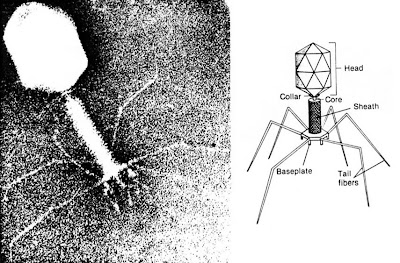I don't often see bacteriophage ecology and evolution papers in the open source literature, but there is a nice one in next month's American Naturalist (occasionally Am Nat selects papers for open access).
The paper by Rick Heineman and colleagues addresses the question of optimal foraging, a body of theory that seeks to explain the food choices of organisms in terms of how they maximize energy intake over time. As a model organism, the authors use the bacteriophage T7, a parasite of Escherichia coli.
Naturally, phages don't "eat" per se, nor do the make conscious "choices", but for the purposes of the theory that's largely irrelevant. We can still model optimal foraging in terms of the evolution of phage host range (i.e. "dietary choices"), provided that phage are able to "discriminate" among possible host types. As the authors write, "Phages have no behavioral plasticity in the usual sense, yet they evolved to make host range choices that qualitatively match optimality predictions."
Heineman et al. found that T7 phage could evolve the ability to discriminate between several host strains. T7wild-type "was independently adapted in two mixes of Escherichia coli strains: C with either B or K12. In both adaptations, C was the permissive host, while the other (B or K12, depending on the adaptation) aborted T7 infections due to deletion of a host gene needed for viral replication. Both adapted phages evolved to largely avoid the nonpermissive host but maintained a high adsorption rate to C." Notably the phage evolved the ability to discriminate via single amino acid substitutions in the tail fiber gene (used to bind host receptors).
 To see if discriminating phage could be favored over non-discriminating phage, Heineman et al.
To see if discriminating phage could be favored over non-discriminating phage, Heineman et al.  used E. coli strains that differed in their resistance to tetracycline with C being Tet resistant and K lacking Tet resistance. Adding tetracycline would alter K into poor quality hosts, but leave C unaffected.
used E. coli strains that differed in their resistance to tetracycline with C being Tet resistant and K lacking Tet resistance. Adding tetracycline would alter K into poor quality hosts, but leave C unaffected.
The authors tested whether increasing tetracycline (at levels that disable, but not kill K cells) in the culture media would favor one phage strain over the other. The results showed that T7Choosy
out competed T7wild-type when tetracycline levels were high, but not when they were low.  The study has implications for other viruses. As the authors write, "the principles demonstrated here for phages may operate in other viral systems. The main requirement is that a virus that avoids infecting one host (or cell type) will have opportunities to infect a different type. This property may apply to many viruses infecting multicellular hosts with respect to tissue tropisms—differences in the ability to infect various tissues within the body. Viruses within a host are likely to be selected to use some tissues and not others, and the nature of selection on tissue tropism may parallel those found here for phages."
The study has implications for other viruses. As the authors write, "the principles demonstrated here for phages may operate in other viral systems. The main requirement is that a virus that avoids infecting one host (or cell type) will have opportunities to infect a different type. This property may apply to many viruses infecting multicellular hosts with respect to tissue tropisms—differences in the ability to infect various tissues within the body. Viruses within a host are likely to be selected to use some tissues and not others, and the nature of selection on tissue tropism may parallel those found here for phages."
Overall this is a very nice study, with clever use of bacteriophages and bacteria, to test a body of theory that has not commonly been tested with microbes. The only main issue is that there is a lack of a quantitative aspect to the study (which is difficult with microbes), and as such, despite the cleverness of the approach, phages might not be the best arena to test optimal foraging theory. Nonetheless, it is an effective demonstration that organisms that cannot make conscious choices can evolve to prefer some resources over others.
Heineman, R., Springman, R., Bull, J. (2008). Optimal Foraging by Bacteriophages through Host Avoidance.. The American Naturalist, 171(4), E149-E157. DOI: 10.1086/528962
Photo: T7 phage from the The Microbial World.

